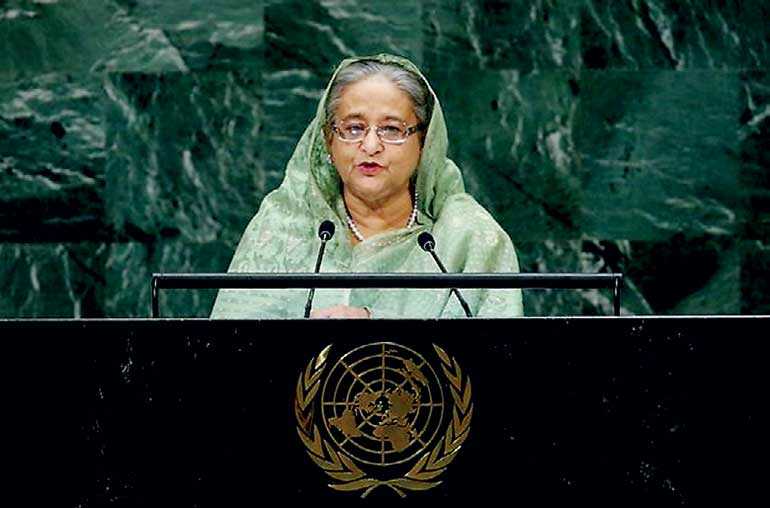Monday Feb 23, 2026
Monday Feb 23, 2026
Tuesday, 2 October 2018 00:00 - - {{hitsCtrl.values.hits}}

FILE PHOTO: Bangladeshi Prime Minister Sheikh Hasina addresses the 73rd session of the United Nations General Assembly at U.N. headquarters in New York, U.S. - REUTERS
DHAKA (Reuters): Bangladesh will consider making changes to a proposed law that journalists and countries such as the United States say could suppress free speech, a government minister said on Sunday after a meeting with a group of editors.
The South Asian nation’s parliament passed the Digital Security Act on Sept. 19, combining the colonial-era Official Secrets Act with tough new provisions such as allowing police to arrest individuals without a warrant.
It would have come into force with the signature of President Abdul Hamid ahead of a general election expected in December.
But Anisul Huq, Bangladesh’s law, justice and parliamentary affairs minister, said the concerns will be raised in Prime Minister Sheikh Hasina’s cabinet. He did not say when that could happen.
“We had a detailed discussion with representatives of the Editors’ Council and took serious note of their concerns,” Huq told Reuters.
“We assured them that if the cabinet agrees, then we may make some amendments. We will also take some measures to make (some of the contentious) sections clear that those will not target the journalist community or silence their voices to reveal the truth.”
The government will again meet with the journalists once the matter is taken up in cabinet, Huq said.
Matiur Rahman Chowdhury, who attended the meeting in his capacity as editor of the Bangla daily Manab Zamin, said: “It’s a rare instance that after passing a law in parliament the cabinet has agreed to sit again to discuss that.
“For now, we are not going to hold any protest or movement as the minister has promised to do something positive. We will wait until that cabinet decision.”
US concern
The proposed law stipulates a maximum jail sentence of 14 years for espionage if an individual is found secretly recording information with electronic instruments inside a government building or for spreading “propaganda” against Bangladesh’s 1971 war for independence from Pakistan.
A further element journalists have opposed is the inclusion of the colonial-era Official Secrets Act, which includes a 14-year sentence for sharing state secrets with an enemy.
Since Hasina’s election victory in 2009 scores of people, including journalists, have been jailed in Bangladesh for criticising the government on the internet. A Bangladesh court this month rejected bail for prominent social activist and photographer Shahidul Alam, who was arrested last month for spreading “propaganda and false information” during widespread student protests.
The proposed law has also attracted strong criticism internationally.
“The United States shares the concerns of the international community that the recently passed Digital Security Act could be used to suppress and criminalise free speech, all to the detriment of Bangladesh’s democracy, development and prosperity,” the US ambassador to Bangladesh, Marcia Bernicat, said in a statement on Sunday.
“We encourage the Government of Bangladesh to consider changes to the law that would bring it into conformity with the Bangladesh constitution and with Bangladesh’s international commitments on human, civil and political rights.”